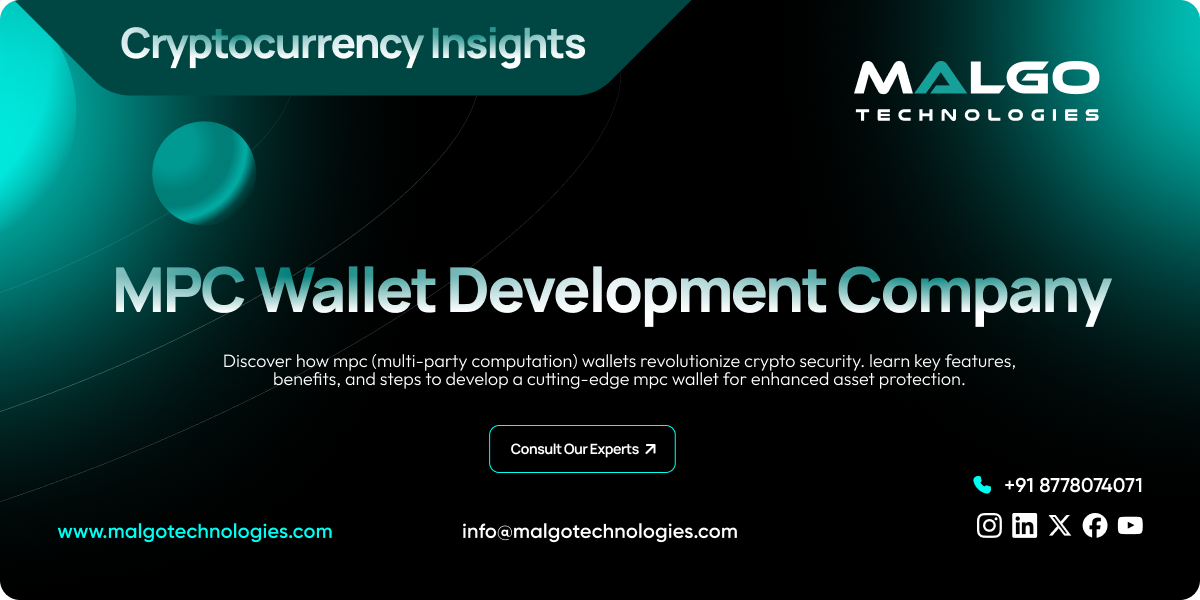Introduction
As the world of digital finance rapidly advances, the need for robust, secure, and scalable solutions becomes more urgent than ever. Enter the Multi-Party Computation MPC wallet a breakthrough innovation transforming how individuals and businesses protect their digital assets. MPC wallets enhance security by dividing control across several participants, rather than depending on just one private key like traditional wallets. This approach significantly lowers the chances of a complete system compromise due to a single vulnerability.
This cutting-edge approach makes it significantly harder for hackers to compromise funds, offering a powerful defense against the growing wave of cyber threats. As security concerns escalate across the digital landscape, MPC wallets are emerging as a trusted and efficient solution for safeguarding cryptocurrencies and other blockchain-based assets.
What is an MPC Wallet?
A Multi-Party Computation (MPC) wallet is a specialized cryptocurrency wallet that leverages advanced Multi-Party Computation technology to securely handle and distribute private key management, enhancing security and control for users.
Unlike traditional wallets that store a complete private key in a single location, an MPC wallet splits the key into multiple parts, held by different parties. These parts collaborate to sign a transaction without ever combining into a full key.
Why Develop an MPC Wallet?
For organizations handling valuable digital assets, ensuring strong security measures continues to be a top priority. Traditional wallets, whether hot or cold, often struggle to provide the level of protection required in high-risk scenarios. MPC wallets solve this problem by eliminating single points of failure.
Moreover, regulatory compliance often demands tighter control and traceability over transactions. An MPC wallet supports these requirements by adding control over approval processes, audit trails, and decentralized signing mechanisms. It allows businesses to keep their assets both safe and accessible, a balance few other solutions can maintain.
Types of MPC Wallet
Institutional MPC Wallets
Designed for enterprises and custodians that manage large sums of assets across multiple accounts with multi-level approval workflows.
Retail MPC Wallets
Built for individuals who require an extra layer of protection without the technical hassle of handling private keys.
Mobile-based MPC Wallets
Integrated into smartphones, enabling users to transact on the go while relying on secure key-sharing mechanisms.
Cloud-based MPC Wallets
Ideal for platforms providing embedded wallet solutions, this system leverages decentralized cloud nodes to securely manage and distribute private key fragments.
Benefits of MPC Wallet Development
Improved Security
The complete private key is never stored or accessible in its entirety at any one time. This makes hacking extremely difficult.
No Single Point of Failure
Even if one device or server is compromised, attackers can’t reconstruct the private key.
Flexible Authorization
Signatures can require approval from multiple parties, providing built-in governance.
Regulatory Readiness
Transaction flows and access control support easier auditability and compliance.
User Experience
Despite its secure architecture, users get a seamless experience, often as easy as using traditional wallets.
Features of MPC Wallet Development
Multi-party Key Generation
Distributed Signature Authorization
Secure Key Recovery
Granular Access Controls
Multi-device Synchronization
Tamper Detection
Audit Logging
Integration with DApps and DeFi platforms
Key Services Offered by Our MPC Wallet Development
Custom MPC Wallet Design
Multi-party Key Sharding and Computation
Backend Infrastructure Development
Integration with Existing Platforms
Security Audits and Penetration Testing
Regulatory Feature Support (KYC/AML tools)
24/7 Maintenance and Support
Step-by-Step Guide to MPC Wallet Development
Requirement Analysis
Outline the purpose, identify the intended audience, and establish clear security goals.
Architecture Planning
Design how key shards will be created, stored, and used across different nodes or users.
Key Generation Module
Set up the system to generate key shards without forming the entire private key.
Signature Mechanism Implementation
Build secure protocols that enable distributed signing.
Access Control Integration
Assign role-based permissions and multi-user approval workflows.
User Interface Design
Develop intuitive dashboards and mobile views for wallet users.
Security Testing
Run simulations to test against known exploits and unauthorized access.
Deployment
Set up the wallet on your infrastructure or integrate it into a blockchain network.
Monitoring and Maintenance
Regularly track and assess wallet functionality while implementing essential security updates to ensure optimal protection and performance.
How Our MPC Wallet Development Stands Out
We focus on building wallets that are not only secure but also scalable and adaptable. Unlike many developers who use pre-built modules, our team writes custom logic suited to each client’s needs. Whether it’s integration with financial APIs, custom UI/UX, or deployment on a private blockchain, we make every component work smoothly.
Moreover, we build our wallets to support high-frequency trading, DeFi protocols, and secure OTC transactions. Performance, dependability, and protection aren’t compromises—they’re core pillars of our approach.
Key Technologies Used in MPC Wallet Development
Multi-Party Computation Protocols
(e.g., Gennaro-Goldfeder, GG20)
Threshold Signature Schemes (TSS)
Zero-Knowledge Proofs
Hardware Security Modules (HSM)
Secure Multi-cloud Infrastructure
Blockchain Platforms (Ethereum, Solana, etc.)
Advanced Encryption Standards
REST and WebSocket APIs for integrations
Why Choose Malgo as an MPC Wallet Development Company?
Malgo brings deep experience in secure blockchain solutions. Our engineers understand the unique demands of enterprises, exchanges, and financial institutions. What sets us apart is our commitment to transparency, long-term support, and security-first development.
We don’t just deliver software—we work as your technology partner. Our team stays involved from idea to post-deployment maintenance, ensuring the wallet evolves as your business grows.
Transparent pricing
On-time delivery
Enterprise-grade security protocols
Custom integrations
Ongoing technical support
NDA protection and secure development policies
Conclusion
Building an MPC wallet is more than a technical choice—it’s a strategic decision to secure digital assets against current and future threats. Whether you're a startup or an established enterprise, investing in MPC wallet development helps protect user trust and maintain operational integrity. Ready to create a custom MPC wallet?

